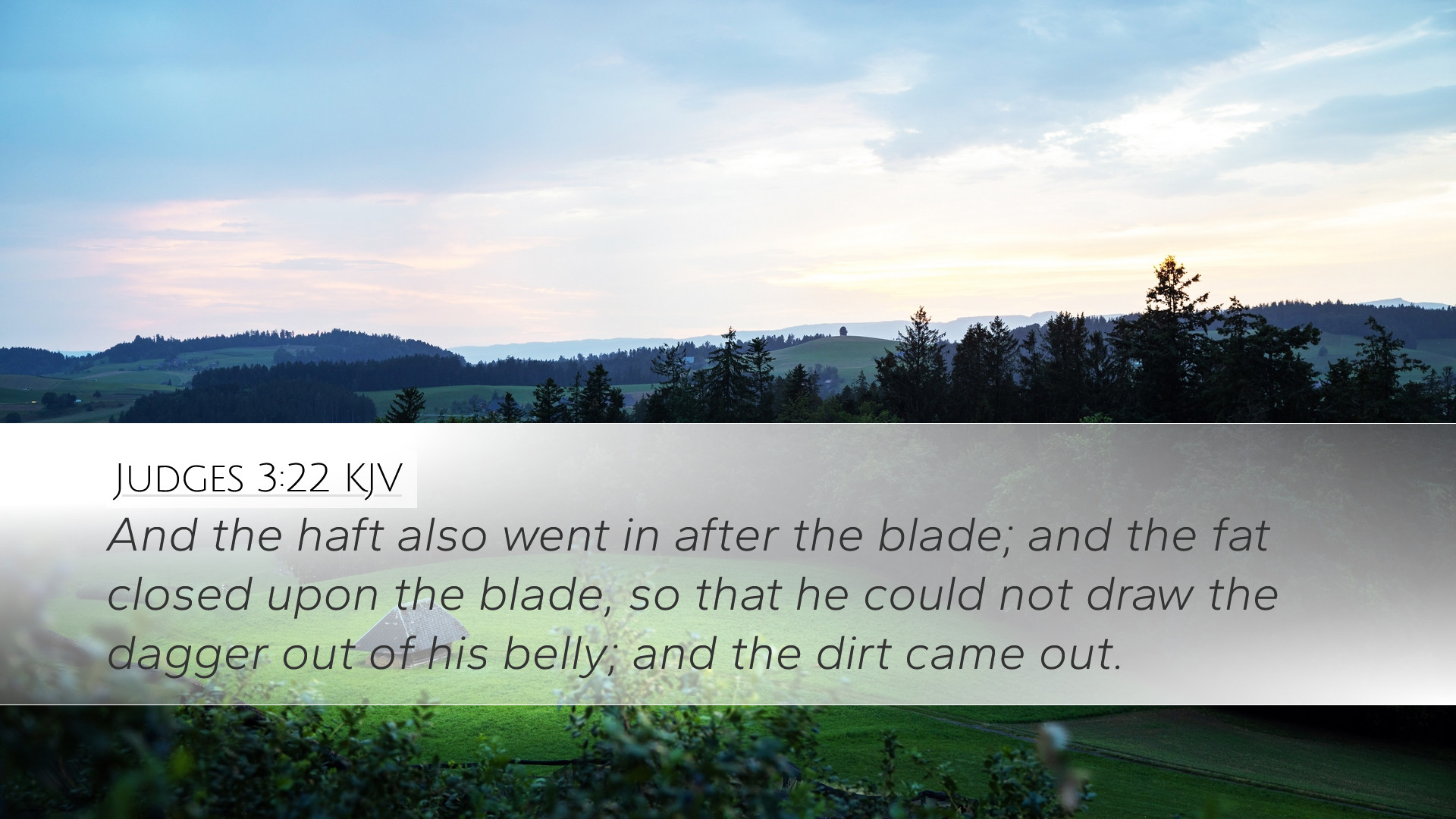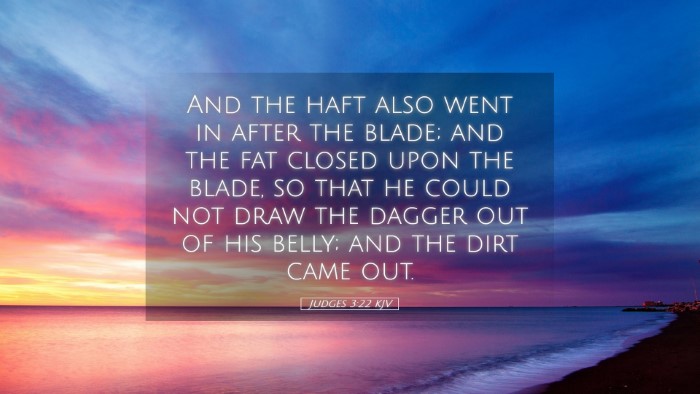Commentary on Judges 3:22
Verse Text: "And the haft also went in after the blade; so he died." (Judges 3:22, KJV)
Introduction
This verse is a part of the narrative detailing the deliverance of Israel from Moabite oppression through the judges God raised up. It offers insights into both the nature of divine deliverance and the intricate details of God's intervention through an unlikely hero, Ehud. Below, we explore various commentaries to distill theological and practical insights relevant for pastors, students, theologians, and Bible scholars.
Context of Judges 3:22
The Book of Judges presents a cyclical pattern of sin, suffering, supplication, and salvation. Judges 3 recounts the story of Ehud, who delivers Israel from Eglon, the King of Moab. The significance of this verse comes at a climactic moment in the narrative where Ehud's unexpected method of assassination illustrates not only his shrewdness but also the divine deliverance at work through his actions.
Commentary Insights
Matthew Henry's Commentary
Matthew Henry emphasizes the decisive nature of Ehud's actions as a demonstration of God’s sovereignty and provision for His people. He suggests that the detail of the "haft" (the handle of the dagger) going in after the blade indicates the completeness of Eglon's demise and serves as a vivid metaphor for the judgment executed upon those who oppose God's will.
Henry also notes that this moment reflects how God utilizes "the foolish things of the world" to confound the wise (1 Corinthians 1:27). Ehud, being left-handed, is a symbol of God's ability to work through the unexpected and unassuming to achieve His purposes.
Albert Barnes' Notes on the Bible
Albert Barnes draws attention to the practical details surrounding the encounter between Ehud and Eglon. He highlights the significance of the dagger's design, which was unusual in that it was made to be concealed and was effective due to its sharpness and length. Barnes argues that this reflects God's role in providing timely means of rescue, demonstrating that God equips His chosen instruments for the tasks at hand.
Moreover, Barnes emphasizes the thematic significance of the verse, stating that it illustrates the principle of divine justice, where evildoers meet their end through the very means they may not expect. The concealed weapon and the surprise attack symbolize God's impeccable timing and justice in dealing with Israel's enemies.
Adam Clarke's Commentary
Adam Clarke delves into the graphic imagery presented in this verse. He provides insight into the cultural context of the period, suggesting that such acts of violence were commonly employed in warfare and assassination during those times. Clarke interprets Ehud’s success as an act of valor that bears profound significance for the Israelites, who at the time were oppressed and in desperate need of a savior.
Clarke also notes the psychological impact of such a defeat on the Moabites. Eglon’s death is portrayed not merely as a physical act but also serves as a demoralizing blow to the Moabite supremacy. The unexpected nature of the attack emphasizes the element of surprise that God frequently employs against those who stand opposed to His people.
Theological Implications
- The Sovereignty of God: This verse showcases how God orchestrates events and uses specific individuals for His redemptive plan. The choice of Ehud, who is described as a left-handed man, highlights that God's ways are not confined to human reasoning.
- The Nature of Deliverance: The body of Eglon symbolizes the victory of God over oppression. The violent ending may challenge contemporary sensibilities, urging readers to grapple with the seriousness of sin and the cost of deliverance.
- God's Justice: The demise of Eglon serves as a reminder of God's ultimate justice. The narrative reinforces that those who oppose God's will will encounter His judgment. It is a call for reflection on the consequences of rebellion against divine authority.
Practical Applications
- God’s Call to Action: Just as Ehud responded to God's call, believers are reminded that they are often called to act in ways that may seem unconventional. Faith requires readiness to step forward, even when the path is unclear.
- Stewardship of Resources: The use of the dagger symbolizes that God provides His people with what they need to fulfill their calling. Believers should consider how they manage their resources and talents in the service of God's mission.
- Courage in Adversity: The narrative encourages the faithful to act courageously in the face of oppression and injustice. Ehud’s example serves as a model for believers today to confront obstacles with determination and trust in God’s providence.
Conclusion
Judges 3:22 encapsulates both a vivid historical account and a profound theological statement. The insights gleaned from public domain commentaries provide depth and richness to our understanding of God’s sovereignty and justice. For pastors, students, and theologians, this passage serves as a reminder of God's ability to use the unlikely and the unexpected for the fulfillment of His divine purposes.


